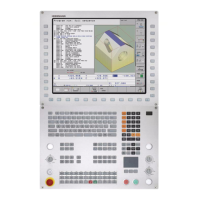July 2013 8.7 Pallet management 1493
Executing a
pallet table
The pallet table is selected and started with PGM MGT like a normal part
program in the Program Run, Single Block and Program Run, Full Sequence
operating modes.
Pallet entries (PAL) and fixture entries (FIX) result in a call for an NC macro.
Program entries (PGM) are run like a PGM CALL.
With MP7683 bit 6, specify if the NC program and the pallet table should
appear simultaneously in the split screen, or if the active NC program or
active pallet table should be shown individually.
With MP7683 bits 0 to 2 and bit 8, specify the operating sequence following
an NC start.
With MP7683 bit 3, specify the operating sequence upon reaching the end
of the pallet table.
Determine with MP7683 bit 4 whether the current pallet table should be
editable with the EDIT PALLET soft key in the Program Run, Single Block
and Program Run, Full Sequence operating modes.
Bit 9 of MP7683 allows you to select whether the EDIT PALLET soft key for
editing the pallet table *.P is displayed in the Program Run modes of
operation.
As soon as a pallet table is selected, M4160 is set.
Through the PLC you can graphically display the tool changer status in the PLC
window and enable the user to control the tool changer through PLC soft keys.
You can provide the user with excerpts from the pallet table for editing (see
"Freely definable tables" on page 1409).
With Module 9035 you can interrogate the active line of the pallet file, and with
Modules 9090 or 9281 you select a certain line in the pallet table. Unlike
Module 9090, a datum shift or datum setting can be executed immediately
with Module 9281.
Example:
NR PAL/PGM W-STATUS METHOD NAME DATUM X Y Z SP-X SP-Y SP-Z CTID
0 PAL 120 0 0 0 150
1 FIX 150
2 PGM BLANK WPO PART1.H
3 PGM BLANK TO PART2.H 120120 0
4 PAL 130 NULL1.D 0 10 15 150
5 PGM BLANK TO PART3.H 100100 100
6 PGM BLANK CTO PART3B.H
[END]

